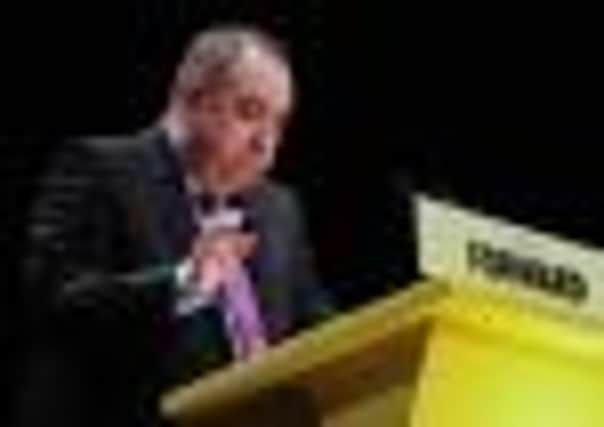Salmond: ‘More childcare cash post-independence’


In his keynote address to his party’s Spring Conference, the First Minister outlined his belief that a new system would attract more women into the workplace and boost growth, but insisted it would not require higher “Scandinavian-style” tax rates to fund.
Salmond used his speech to set out his vision for an independent Scotland, while attacking the policies of the UK government. He told delegates that the Scottish Government’s council of economic advisers had been asked to produce an analysis of the impact on Scotland of moving to levels of childcare support seen across other European countries.
Advertisement
Hide AdAdvertisement
Hide AdThe First Minister said: “Our ambitions for childcare are the hallmark of our approach to social and economic policy – we promote the measures we do because they advance both our economy and our society.


“Some argue there is a contradiction between the two, but the reality is that a progressive social policy boosts the economy, and a dynamic economy enables us to build the fairer society we want. Each is the handmaiden of the other.”
Salmond placed no timetable on the aspiration, telling delegates: “It will not be done in a day, or a year, or even completed in the first term of an independent parliament.
“But I believe a transformational shift towards childcare should be one of the first tasks of an independent Scotland.”
The move was last night branded a “sweetener” to attract more women to vote Yes in next year’s referendum and comes after the Coalition Government at Westminster announced increased childcare support in last week’s Budget.
In the UK, about 25 per cent of childcare costs for families are currently met by the state. Salmond made clear, however, that the SNP was looking to emulate other European countries like Finland where 85 per cent of childcare is publicly funded.
In support of the argument that there would be no need to raise taxes to fund the measure, the SNP pointed out that 80 per cent of childcare was met by the state in Germany and 75 per cent in Iceland. Those two countries have similar taxation levels, compared to the size of the economy, as the UK.
Salmond said about 66 per cent of women are in work in Scotland, compared with 76 per cent of men, and this was a gap he was determined to drive down. “In terms of lower numbers of women in employment it really doesn’t have to be like that,” he said. “Elsewhere in Europe the gap is much, much less. If we closed the opportunity gap we would add to our national wealth and to our taxation base by mobilising the skills of women into our workforce.”
Advertisement
Hide AdAdvertisement
Hide AdBut Salmond was accused of using the childcare promise as an “independence sweetener” by Liberal Democrat leader Willie Rennie.
“The First Minister’s decision to put childcare into his list of independence promises for tomorrow is not the outcome 50,000 two-year-olds who will grow up in Scotland between now and the referendum deserve,” he said. Labour business manager Paul Martin accused the First Minister of an “astonishingly negative” speech.
He added: “He promises better childcare, but six years on since his last commitment to increase pre-school provision, we’re still waiting.”
Salmond’s speech also revealed all SNP-led councils will now follow the lead of Dundee in halting evictions where tenants are unable to pay the rent because of the so-called bedroom tax, in which housing benefit will be cut if they have an unoccupied room.
The measure was branded “iniquitous, unfair and anti-family” by the SNP leader. “Why should people who would impose such iniquity have any power and authority over the Scottish people,” he said.
“What Scotland needs is not mitigation but power, not just a defence against Westminster but a removal of Westminster authority over Scotland.”
The gains of devolution, like free personal care for the elderly, free travel for pensioners and free university education for Scottish students risk being undermined within the UK, according to the SNP leader. “With each passing day it becomes clearer that the Westminster system is not fit for any purpose – it is further away than ever from Scotland’s values and past its time.”
Deputy First Minister Nicola Sturgeon will today set out the economic case for independence, citing figures which show that for the past 30 years Scotland paid an average of £1,700 per head more in taxes to Treasury coffers than the UK as a whole, although this includes corporate tax revenues like North Sea oil and gas cash.
“How dare any unionist politician say that Scotland doesn’t pay her way,” she will say.